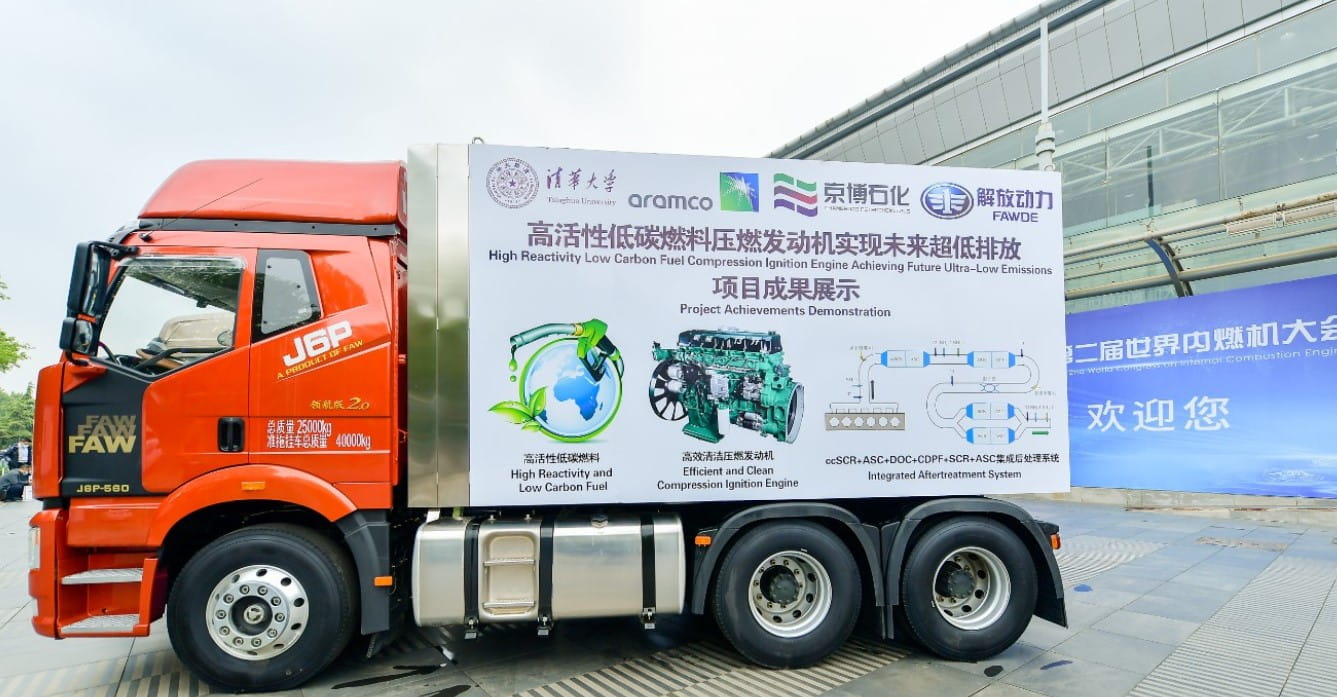Aramco demonstrates advanced technology that would contribute to driving heavy-duty truck emissions toward zero at 2nd WICE

At the 2nd World ICE Congress, Aramco along with its partners Tsinghua University, FAWDE and Shandong Chamboard Petrochemicals demonstrated an advanced truck with near-zero pollutant emissions achieved by co-optimizing its fuel, engine and after-treatment system.
- Partnered with Tsinghua University, FAWDE and Shandong Chamboard Petrochemicals to introduce innovative technological solutions to address public health concerns associated with freight activities.
- Demonstrated an advanced truck with near-zero emissions achieved by co-optimizing its fuel, engine and after-treatment system.
There are significant untapped opportunities to unlock the potential of Internal Combustion Engines (ICE). This was a key theme that emerged during the Second World Congress on Internal Combustion Engines (WICE), held in Jinan on April 21-24. For the first time, Aramco joined leading organizations in China to demonstrate the feasibility of reducing tailpipe emissions into the atmosphere toward zero, using an actual combustion engine heavy-duty truck.
The Congress, which was organized under the theme, “Green, Efficient, Intelligent and Reliable,” gathered top scientists, engineers, and business leaders from academia and industry. Aramco's Chief Transport Technologist, Dr. Amer Amer, was also invited to deliver a keynote speech that highlighted the opportunities and challenges for transport in a carbon constrained world.
More than 100 passenger and commercial engines were displayed during the exhibition, including Aramco's partnership with Tsinghua University, FAWDE and Shandong Chamboard Petrochemicals Company to exhibit a state-of-the-art heavy-duty truck.
By co-optimizing the fuel, engine and the vehicle after-treatment system, the team successfully demonstrated near-zero criteria emissions without sacrificing fuel efficiency. The advanced truck, a product of more than 3 years of collaborative efforts, achieved more than 90% reduction in the emission of NOx pollutant compared to existing regulations. It was achieved through a combination of novel and sustainable high reactivity “gasoline-like” fuel formulation, an eco-friendly compression ignition engine, and a highly-effective, compact after-treatment system. This is a remarkable breakthrough considering that the technologies can already meet and exceed the upcoming regulations in California for 2027, which are considered to be among the most stringent in the world.
The partnership, which was driven by a shared vision of developing and advancing holistic and sustainable solutions for the transport sector, has unlocked a new paradigm for addressing an old problem. By treating the fuel, engine, and the after-treatment system as a single integrated entity, the team developed innovative technological solutions to address public health concerns associated with freight activities.
Aramco is committed to progressing and delivering cost-effective solutions for low-emission and more efficient transport. In his keynote address, Dr. Amer outlined the prospects for decarbonizing the transport sector using low-emissions fuels that are derived from captured CO2, and low-carbon hydrogen. Aramco's global Transport Technologies program aims to advance game-changing technological solutions that could significantly reduce emissions in the transport sector and improve fuel efficiency for energy consumers around the world. According to Dr. Amer, “In a carbon constrained world, sustainable mobility is contingent upon addressing climate concerns, and continued development of advanced ICE platforms is necessary. It is all about the right technology solution for the right sector, at the right time, and in the right market.”
This is another example of how Aramco is supporting China in its commitment toward carbon neutrality. Last year, Aramco provided subject matter expertise in a joint study for the preparation of the “China Automobile Low Carbon Action Plan (CALCAP) – 2020 Research Report,” led by Automotive Data of China Co., Ltd. (ADC), an esteemed division within the independent think-tank, China Automotive Technology and Research Center Co., Ltd. (CATARC). The report is an initiative to support China in peaking GHG emissions by 2030 and achieving carbon neutrality by 2060, as part of its national commitment to address the challenges of the global climate.

.jpg?cx=0.5&cy=0.5&mw=10)

